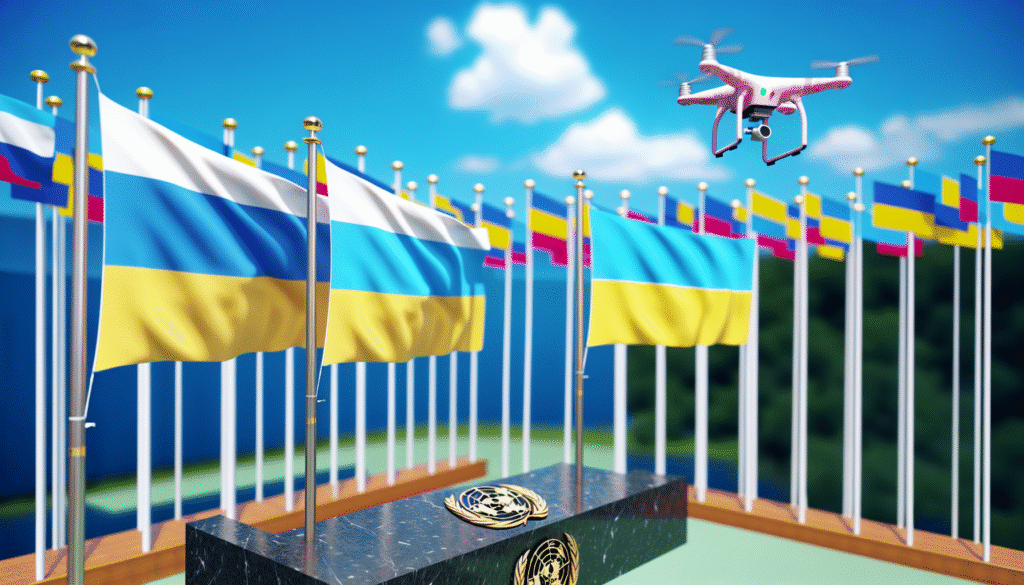The Intensifying Conflict Between Russia and Ukraine
Amid Diplomacy, Accusations Fly
As the world turns its attention to the ongoing conflict in Ukraine, a stark exchange of accusations erupted between Russia and Ukraine on Monday, highlighting the escalation of drone strikes targeting civilian areas. Ukrainian President Volodymyr Zelenskyy characterized the coming week as “very intense” in terms of diplomatic efforts at the U.N. General Assembly in New York, where discussions surrounding the conflict are expected to be a focal point.
Zelenskyy’s agenda aims to boost support for a U.S.-led peace initiative, advocating for a ceasefire and proposing a summit with Russian President Vladimir Putin. However, the response from Moscow has been lukewarm, with officials raising objections to various proposals, indicating a complex path to achieving peace.
Growing International Concerns
Recent events have heighted international concerns, particularly regarding the potential for the conflict to spill beyond Ukraine’s borders. Tension escalated as European countries raised alarms over reported Russian provocations. Notably, incidents of Russian drones landing in Poland and military aircraft breaching Estonian airspace have exacerbated fears of a broader conflict within NATO territories.
Latvian President Edgars Rinkevics shared insights on these developments, suggesting that Russia is testing NATO’s resolve while attempting to undermine Western support for Ukraine. He emphasized the careful calibration required in responding to Russian maneuvers, noting that the Kremlin’s provocations remain just below a clear “red line”—a situation that could easily spiral into chaos.
Denying Violations and Escalating Tensions
In response to the accusations regarding airspace violations, Russia’s Defense Ministry firmly denied any wrongdoing. Kremlin spokesman Dmitry Peskov described the claims from Estonia and NATO as “void” and reflective of a broader narrative that promotes confrontation rather than resolution. This rhetoric underscores the escalating mutual distrust between the parties involved.
President Zelenskyy’s attendance at the U.N. General Assembly represents a crucial moment. He hopes to galvanize international support against the invasion, scheduling nearly two dozen meetings with leaders worldwide. The urgency of the situation compels Zelenskyy to stress the necessity for decisive action to avert further violence and suffering.
Casualties and Civilian Impact
As diplomatic efforts unfold, the on-ground reality remains grim. Recent assaults have intensified, with at least seven Russian aircraft targeting the southern Ukrainian city of Zaporizhzhia overnight, leading to three fatalities and injuries to two additional civilians. Reports from regional officials indicate that residential buildings and civilian infrastructure were among the struck sites, raising concerns about the ever-increasing impact on non-combatants in the conflict.
In a grim statistical revelation, Zelenskyy mentioned the barrage of attacks from Russia over the past week, which included over 1,500 strike drones, numerous bombs, and missiles, revealing the staggering level of arms used against Ukraine.
Mutual Accusations of Drone Strikes
Both countries remain entrenched in a cycle of mutual accusations regarding drone strikes. Reports from the Russian-occupied Crimea indicated that Ukrainian drones targeted popular resort areas, leading to casualties among civilians—even as Russian officials insist there are no military facilities in those zones. Correspondingly, Ukrainian officials reported drone attacks in Russia’s Belgorod region, further showcasing the escalation that affects civilians on both sides.
This back-and-forth not only escalates tensions between the two nations but also muddies the narrative of accountability and responsibility as each side seeks to frame itself as the victim of aggression.
The Stalemate Continues
As the week progresses, the international community eagerly anticipates whether this round of diplomacy will yield any tangible outcomes. While Zelenskyy’s push for sanctions against Russia continues, the entrenched positions of both nations illustrate a difficult road ahead. The persistent cycle of violence, characterized by drone strikes and civilian casualties, complicates any hope for peace and generates a call for a robust international response.
Zelenskyy’s insistence that “without strength, peace will not prevail” echoes throughout the halls of diplomacy, serving as a poignant reminder of the complexities that lie ahead. The need for action remains critical, but as both sides entrench themselves in their perspectives, the quest for resolution appears ever more daunting.

